S-Bahn Berlin at a Glance
Brief summary: Company figures, quarterly figures and key facts
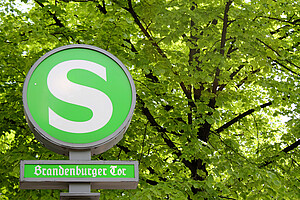
Das Signet an der S-Bahn-Station Brandenburger Tor
- ©
- ArTo - Fotolia
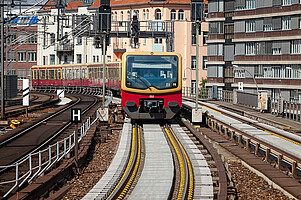
The distinctive single-piece front pane has earned our 481 series its nickname “Diving Goggles”.
- ©
- David Ulrich I photo&retouch
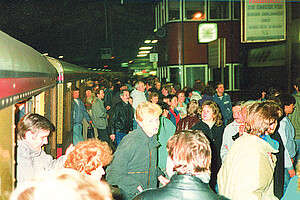
Unvergesslich, die Zeit des Mauerfalls: der S-Bahnhof Friedrichstraße im November 1989
- ©
- Udo Dittfurth
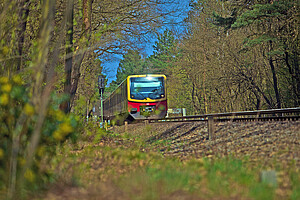
Zahlreiche Ausflüge in Berlin und im Umland beginnen bereits mit einer S-Bahn-Fahrt
- ©
- Joachim Donath Photographie
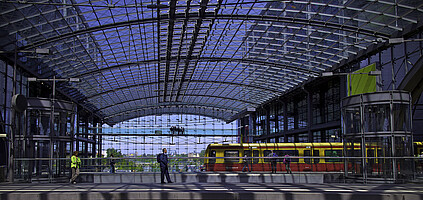
Berlins schönste Seiten: eine Baureihe 481 im Hauptbahnhof
- ©
- Copyright: Joachim Donath Photographie
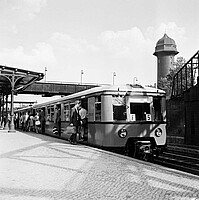
Ein Zug der Baureihe 167 am S-Bahnhof Ostkreuz im Jahr 1964
- ©
- Historische Sammlung der DB AG
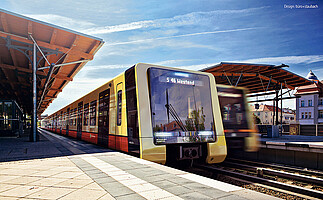
Production Series 483/484
- ©
- büro+staubach berlin
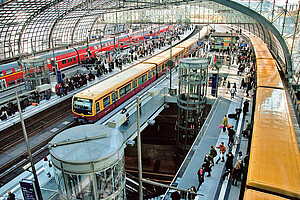
Berlin Hauptbahnhof (Central Station)
Berlin Hauptbahnhof (Central Station)
| Employees* | |
|---|---|
Number of Employees | 3,090 |
| > operators & drivers | 1,361 |
| Trainees | 183 |
| S-Bahn Network* | |
|---|---|
| S-Bahn Routes | 16 |
| Route Network | 340 km |
| > in Berlin | 257 km |
| > in Brandenburg | 83 km |
| Train Stations | 168 |
| > in Berlin | 132 |
| > in Brandenburg | 36 |
| Passengers* | |
|---|---|
| Total Number of Passengers per year | 456 Mio. |
| Passengers per work day | 1.4 Mio. |
| Average travel distance | 9.7 km |
| Vehicles* | |
|---|---|
| Train Fleet in quarter trains (two-car-unit) | 756 |
| Average number of years in service | 19 years |
| Average travel speed | 39 km/h |
| Transport performance* | |
|---|---|
| Operating performance | 32.06 Mio Train KM |
| Transportation performance | 4,421 Mio Passenger KM |
| Service & Sales* | |
|---|---|
| Employee operated sales facilities (SBB + extern) | 48 |
| S-Bahn-ticket machines | 441 |
*State: 31.12.2024
Mobility and flexible services for passengers of the capital and surrounding region
In the midst of the Berlin bustle, mobility and short-distance travel is a top priority. Around 1.4 million passengers commute on the S-Bahn during the average work week. Our red and yellow trains are just as iconic to the Berlin cityscape as the Brandenburg Gate and the TV Tower. Our employees provide service to the capital 24 hours a day, 365 days a year. The 340-kilometer route network, complete with 168 stations, is served by 16 lines connecting the city with the surrounding region.
We offer versatile services: a sufficient number of trains plus a nationwide network of customer centers and ticket machines as well as employees on the platforms of central S-Bahn stations, who are happy to provide information at any time. Since 2021, we will set a milestone in quality with the new S-Bahn 483/484 production series.
S-Bahn Berlin: Interaction With Public Transportation Partners
Our multi-facetted portfolio also includeds a list of successful partners who all assume crucial tasks within the Berlin and Brandenburg public transportion system.
The History of S-Bahn in Berlin – inseparably linked to Berlin
In 1924, the first electric S-Bahn rolled down the tracks from Berlin to Bernau: the beginning of S-Bahn history in the making. With the fall of the wall, new challenges came our way: a route network that was forcefully divided could now grow together again and within one and a half decades, we were able to get the barren tracks functioning again. Today, we are continuously working to improve comfort and services for the passengers of Berlin and the surrounding region.
Active Commitment to the Environment in Berlin and Brandenburg
In the field of environmental protection, we see ourselves in a position of responsibility. We pride ourselves on being able to offer the capital an environmentally friendly means of transportation. Our employees are going above and beyond to improve comfort, service, and reliability while making large and small contributions to the preservation and protection of natural resources.
Commitment to the People of the Capital
Social and cultural commitment is an important part of the corporate philosophy of S-Bahn Berlin. In many ways, we support clubs, aid organizations, and initiate charity projects. In addition, the S-Bahn Berlin has invested €65,000 employing two mobile case helpers. These helpers reach out to physically hard-hit victims, especially those who seek refuge in the public transportation and train stations. The goal is to show vagrants ways out of homelessness. The mobile case helpers work on site, in direct contact with the clients. The Station Mission at Zoologischer Garten coordinates the project.
One of the Biggest Employers and Job Trainers in the Region
Our company employs more than 3,000 people who are committed to making their daily mark in a wide variety of areas so that the S-Bahn Berlin can present its passengers with attractive offers and services. In order to meet the growing challenges of a constantly expanding capital metropolis, we are still looking for reinforcement in the field of train operators. Since 1934, around 19,000 apprentices have successfully completed their training in a wide variety of occupations.
S-Bahn Berlin – a Subsidiary of the DB Regio AG
The S-Bahn Berlin GmbH was founded on January 1, 1995 and is a wholly owned subsidiary of DB Regio AG. DB Regio AG is responsible for the local passenger transportation of the Deutsche Bahn AG in Germany.
Our social responsibility for sustainability and human rights
S-Bahn Berlin has been firmly anchored as a mobility provider in the Berlin-Brandenburg region since 1924 and employs around 3,000 people. We are aware of our great social and ecological responsibility. That is why we want to ensure responsible and sustainable value creation along our entire supply chain and uphold and respect human rights.
For us, economic success and socially responsible behaviour are not contradictory, but rather mutually dependent. We also expect our OEMs and other business partners to treat people and the environment with respect as the basis for reliable and sustainable cooperation.
We report to the German Federal Office for Economic Affairs and Export Control on the fulfillment of our due diligence obligations under the LkSG. The corresponding reports for the last two fiscal years can be viewed here: